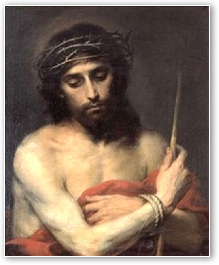The Allegory of Our Lives
- FATHER GEORGE W. RUTLER
In "As You Like It", Shakespeare spoke of all the world as a stage.
 He invoked the stage as a substitute for human experience, just as William Jennings Bryan spoke of a "cross of gold" to represent his day's controversial gold standard. Bryan may have been something of a blowhard, and certainly not Shakespeare's aesthetic twin, but both mastered the art of metaphor: using a word as a stand-in for something else. If you stretch out a metaphor, you get an allegory, so that a narrative poem like Virgil's Aeneid represents all the ups and downs of life, or Tolkien's The Lord of the Rings is palpably about Christian spiritual combat, even though he strongly denied that his Catholicism infused it.
He invoked the stage as a substitute for human experience, just as William Jennings Bryan spoke of a "cross of gold" to represent his day's controversial gold standard. Bryan may have been something of a blowhard, and certainly not Shakespeare's aesthetic twin, but both mastered the art of metaphor: using a word as a stand-in for something else. If you stretch out a metaphor, you get an allegory, so that a narrative poem like Virgil's Aeneid represents all the ups and downs of life, or Tolkien's The Lord of the Rings is palpably about Christian spiritual combat, even though he strongly denied that his Catholicism infused it.
It is tempting to embrace Holy Week as the greatest of all allegories — "the greatest story ever told" — for the tragedy and triumph of Christ surpass all other stories. The flaw and danger is that such rhetoric might give the impression that it is only a story, loose with facts and too emotive to actually have happened. The apostles did not think so: they were so shocked by it that the risen Christ had to coax them out of their moral stupor and show that he was not a ghost, just as he berated the two men on the Emmaus road for not having understood that these events had to have happened.
In long retrospect, these days from Palm Sunday to Easter were not an allegory; more precisely, they were what every noble allegory tries to portray. Man is the allegory and Christ is the fact, and the whole life of grace consists in growing day by day into that fact, rather than living as half human, compromised by sin, like a machine with a dying battery. The life of Christ is not an allegory; our lives are an allegory of the life of Christ. "You have not chosen me: I have chosen you" (John 15:16).
Plato's allegory of the cave is a strong image of how we perceive existence from a limited human perspective. People chained in a cave see images illuminated by a fire behind them only as shadows cast onto the wall they face. That is the way the human intelligence perceives reality unaided by God. Christ abolishes the shadows and lets us see the ultimate realities directly: Death, Judgment, Heaven and Hell. Saint Paul called our daily concerns and perceptions "things which are a mere shadow of what is to come; but the substance belongs to Christ" (Colossians 2:17).
Jesus does not want those he loves to live limited lives. The old lament was, "Man is like a mere breath; his days are like a passing shadow" (Psalm 144:4). In Holy Week, the cross is not a fabricated metaphor. It is the truth that can make our lives eternal.
 This is Meaghen Gonzalez, Editor of CERC. I hope you appreciated this piece. We curate these articles especially for believers like you.
This is Meaghen Gonzalez, Editor of CERC. I hope you appreciated this piece. We curate these articles especially for believers like you.
Please show your appreciation by making a $3 donation. CERC is entirely reader supported.

Acknowledgement
 Father George W. Rutler. "The Allegory of Our Lives." From the Pastor (March 20, 2016).
Father George W. Rutler. "The Allegory of Our Lives." From the Pastor (March 20, 2016).
Reprinted with permission of Father George W. Rutler.
The Author
 Father George W. Rutler is the pastor of St. Michael's church in New York City. He has written many books, including: The Wit and Wisdom of Father George Rutler, The Stories of Hymns, Hints of Heaven: The Parables of Christ and What They Mean for You, Principalities and Powers: Spiritual Combat 1942-1943, Cloud of Witnesses — Dead People I Knew When They Were Alive, Coincidentally: Unserious Reflections on Trivial Connections, A Crisis of Saints: Essays on People and Principles, Brightest and Best, and Adam Danced: The Cross and the Seven Deadly Sins.
Father George W. Rutler is the pastor of St. Michael's church in New York City. He has written many books, including: The Wit and Wisdom of Father George Rutler, The Stories of Hymns, Hints of Heaven: The Parables of Christ and What They Mean for You, Principalities and Powers: Spiritual Combat 1942-1943, Cloud of Witnesses — Dead People I Knew When They Were Alive, Coincidentally: Unserious Reflections on Trivial Connections, A Crisis of Saints: Essays on People and Principles, Brightest and Best, and Adam Danced: The Cross and the Seven Deadly Sins.




